Featured
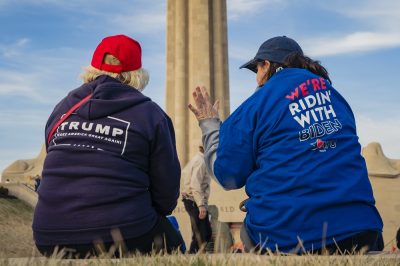 The idea that “the country” is “deeply divided” is ludicrous. White people are divided. By Elie Mystal / The Nation
The idea that “the country” is “deeply divided” is ludicrous. White people are divided. By Elie Mystal / The Nation
The thing is, while the Trump coalition is every bit as stubborn, racist, and vile as we’d feared, the idea that “the country” is “deeply divided” is ludicrous. White people are divided. White people can’t stand together to reject white supremacy. Black people repudiated Trump just fine. We’d also launch him into the sun, if you’d let us—free of charge. Read more
Related: ‘And THAT’S That!’ Jamelle Bouie Breaks Down The 2020 Election. By
Political / Social
 We need to talk about the white people who voted for Donald Trump. By Fabiola Cineas and Anna North / Vox
We need to talk about the white people who voted for Donald Trump. By Fabiola Cineas and Anna North / Vox
Americans will be dissecting the 2020 election for years to come, with analysts and ordinary voters alike parsing who voted for whom and wondering why this race was such a nail-biter. But amid all the remaining uncertainty, one thing is abundantly clear: White people, yet again, showed up for Donald Trump. Read more
Related: Why America’s Attitude Towards Racism Hasn’t Really Changed. By Justin Worland / Time
Related: Why Trump Voters Used The Economy As An Excuse To Vote For Him. By Emily Peck / HuffPost
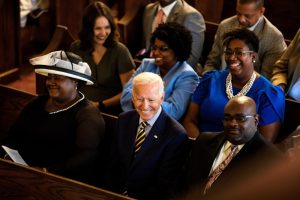 How Black voters in key cities helped deliver the election for Joe Biden. By Janell Ross / NBC News
How Black voters in key cities helped deliver the election for Joe Biden. By Janell Ross / NBC News
Political operatives and others felt that the election would come down to Donald Trump’s mythical all-white suburbs filled with stay-at-home moms or Joe Biden’s ability to convert them. Instead, it was decided in racially diverse urban centers and increasingly diverse suburbs in Pennsylvania, Michigan, Wisconsin, Nevada, Arizona and Georgia. The Black people who make up 39 percent or more of the population in those areas chose Biden, with some exceptions. In fact, once the vote counts from Philadelphia, Detroit, Milwaukee and Atlanta started to near completion, Trump’s lead in their respective states disappeared. Read more
 Juan González: The Media Has It Wrong. Record Latinx Turnout Helped Biden. White Voters Failed Dems. By Juan González / Democracy Now
Juan González: The Media Has It Wrong. Record Latinx Turnout Helped Biden. White Voters Failed Dems. By Juan González / Democracy Now
The main story is that people of color, especially Latinos, flocked to the polls in numbers that far exceeded what the experts had expected, while the total number of votes cast by white Americans barely increased from the last presidential election,” says González. “How come none of the experts are asking why white voters underperformed the Democratic Party?” Watch here
 Once again, Democrats have misunderstood minorities. By Fareed Zakaria / Wash Post
Once again, Democrats have misunderstood minorities. By Fareed Zakaria / Wash Post
The dominant Democratic approach is that minority groups face deep (systemic) discrimination and need to be protected with active measures by the government across a series of fronts. This idea is rooted in the experience of Black people, for whom it is entirely applicable. America’s treatment of Black people has been cruel, with policies that have broken their families and treated them as either subhuman or as second-class citizens. Historical, structural barriers have left a lasting imprint, and discrimination persists to this day. Other immigrants — almost all of whom came voluntarily, not bound in chains — have had a very different experience. Read more
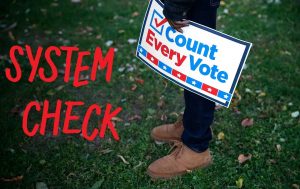 White Supremacy Is Baked Into Our Electoral System. By Melissa Harris-Perry and Dorian T. Warren / The Nation Podcast
White Supremacy Is Baked Into Our Electoral System. By Melissa Harris-Perry and Dorian T. Warren / The Nation Podcast
Last week on System Check, your hosts Melissa Harris-Perry and Dorian Warren dug into all the different ways this country makes it hard for people to cast their ballot. But it’s one thing to vote—on this week’s show, they explain why it’s a whole other thing to get that vote to matter. On this week’s episode, the deep, foundational biases of our democracy come back to haunt us—again. Listen here
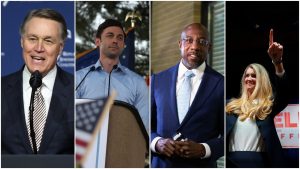 Georgia preps for war with Senate majority on the line. By James Arkin, Andrew Desiderio and Elena Schneider / Politico
Georgia preps for war with Senate majority on the line. By James Arkin, Andrew Desiderio and Elena Schneider / Politico
Democrats failed to deliver in Senate battlegrounds this week, but both parties are still short of a majority in the chamber. So now Georgia holds the keys to control of the Senate, with both of the state’s races appearing likely to head to runoffs in early January. And with Joe Biden favored to win the presidency, Democrats could win control of a 50-50 Senate if they flip both seats. Read more
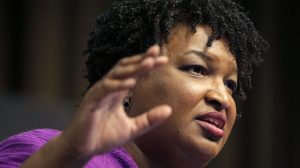 How Stacey Abrams and other Georgia activists laid the groundwork for 2020. By Emma Hinchliffe / Fortune
How Stacey Abrams and other Georgia activists laid the groundwork for 2020. By Emma Hinchliffe / Fortune
In 2016, Abrams explained her Georgia strategy: as President Obama did in North Carolina in 2008, turn out Black and brown voters likely to vote for the Democratic Party while simultaneously appealing to white moderates. But, because of differences between Georgia’s electorate and North Carolina’s, she argued that the white moderate approach should be a smaller part of the equation for Democrats in the Peach State. Georgia Democrats, Abrams said, should put their resources behind the Black and brown voters who, if encouraged to turn out, would support the party. Read more
Related: Stacey Abrams on minority rule, voting rights, and the 2020 election. By Ezra Klein / Vox Podcast
 Georgia’s political shift – a tale of urban and suburban change. By Jan Nigman / The Conversation
Georgia’s political shift – a tale of urban and suburban change. By Jan Nigman / The Conversation
The key drivers of Georgia’s changing electorate are ongoing demographic shifts, combined with urban and suburban growth. Since 2000, the population of the Atlanta metropolitan region has grown tremendously, making it one of the three fastest-growing metro areas in the nation. It now contains about two-thirds of Georgia’s entire population. The rest of the state’s growth has been concentrated in other smaller metro areas, such as Savannah and Macon. At the same time, large swaths of rural Georgia have witnessed population decline. Read more
 Fox News, Murdoch-Owned Papers Urge Trump to ‘Leave Office With Dignity.’ By Benjamin Fearnow / Newsweek
Fox News, Murdoch-Owned Papers Urge Trump to ‘Leave Office With Dignity.’ By Benjamin Fearnow / Newsweek
Fox News hosts and editorial boards at two of Rupert Murdoch’s largest newspapers are demanding President Donald Trump either present evidence or immediately cease allegations of “voter fraud,” urging him to “leave office with dignity” should he be unable to disprove his defeat. Read more
Related: Murdoch Family Tries to Dodge Backlash for Fox News. By Peter Maass / The Intercept
‘ We have to understand the motivation for why people hate,’ says former neo-Nazi leader. By KK Ottesen / Wash Post
We have to understand the motivation for why people hate,’ says former neo-Nazi leader. By KK Ottesen / Wash Post
Christian Picciolini, 47, is an award-winning television producer, public speaker, author, peace advocate and former neo-Nazi leader. He is the founder of the Free Radicals Project, which helps people disengage from hate and violence-based extremism. His latest book is “Breaking Hate: Confronting the New Culture of Extremism.” Read more
 Who Is AOC: Alexandria Ocasio-Cortez on Her Rise to Political Power. By Michelle Ruiz / Vanity Fair
Who Is AOC: Alexandria Ocasio-Cortez on Her Rise to Political Power. By Michelle Ruiz / Vanity Fair
Her Republican colleagues had, up until then, been civil. But one day in late July, Alexandria Ocasio-Cortez stood on the steps of the U.S. Capitol while Representative Ted Yoho lost his shit. The Florida Republican, incensed by the New York congresswoman’s recent comments linking crime and poverty, jabbed his finger in her face, calling her “crazy” and “disgusting.” She told Yoho he was being rude and went into the Capitol to vote. As Yoho descended the steps, he called her a “fucking bitch.” Read more
 BLM Activists Demanded Police Accountability. In City After City, Voters Agreed. By Madison Pauly and Samantha Michaels / Mother Jones
BLM Activists Demanded Police Accountability. In City After City, Voters Agreed. By Madison Pauly and Samantha Michaels / Mother Jones
Across the county, there were at least 20 ballot measures dealing with law enforcement reform—more than in previous elections—and all but one of them passed. “All of this is just a culmination of the years of organizing that has happened by Black folks,” Chris Melody Fields Figueredo, who leads the nonprofit Ballot Initiative Strategy Center, told Bloomberg CityLab last month. Read more
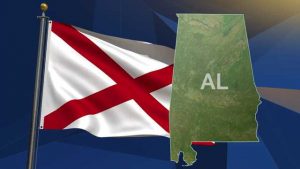 Alabama votes to allow purge of racist constitutional language. By Brian Lyman / USA Today
Alabama votes to allow purge of racist constitutional language. By Brian Lyman / USA Today
Alabama voters Tuesday approved a constitutional amendment that could lead to the removal of racist language from the state Constitution. The main purpose of the measure is purging the state’s governing document of racist language, reflecting its undemocratic origins. The 1901 Constitution was framed to disenfranchise Blacks and poor whites, and includes language that bans interracial marriage and requires public schools to be segregated. Read more
 Medical school students’ Hippocratic oath asks doctors to combat racism, misinformation. By Jacqueline Howard / CNN
Medical school students’ Hippocratic oath asks doctors to combat racism, misinformation. By Jacqueline Howard / CNN
In a new Hippocratic oath written by the University of Pittsburgh School of Medicine’s Class of 2024, incoming students pledged to fight the spread of misinformation and racial injustice. The oath names Breonna Taylor, George Floyd and Ahmaud Arbery. The students pledge to be allies to underserved communities “in order to dismantle the systemic racism and prejudice that medical professionals and society have perpetuated” and the students pledge to combat misinformation “in order to improve health literacy.” Read more

Navy Has Few Black Admirals; Some Blame Discrimination. By Steve Walsh / NPR
Only 10 of the Navy’s 268 admirals are African-American, most are rear admirals and none holds the two highest ranks, according to data from a task force that’s examining the history of discrimination in the Navy. Rear Adm. Alvin Holsey, who heads the One Navy Task Force for the Chief of Naval Operations, concedes that those numbers are small. Read more
History / Culture
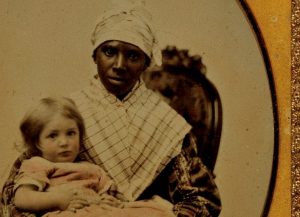 The Visual Documentation of Racist Violence in America. By Mary Niall Mitchell /AAIHS
The Visual Documentation of Racist Violence in America. By Mary Niall Mitchell /AAIHS
With the ubiquity of digital cameras in the twenty-first century—96% of Americans own some kind of cell phone—the importance of visual evidence in the fight against racial injustice is clear. With digital footage, Crump insists “we are changing the narrative.” Matthew Fox-Amato’s Exposing Slavery: Photography, Human Bondage, and the Birth of Modern Visual Politics in America (2019) considers photography’s place at the root of the battle over slavery before, during, and after the Civil War. Read more
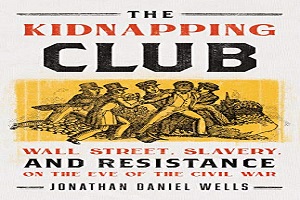 When a Kidnapping Ring Targeted New York’s Black Children. By Paul Sehgal / NYT
When a Kidnapping Ring Targeted New York’s Black Children. By Paul Sehgal / NYT
In 1833, Black children began to vanish from the streets of New York City. Frances Shields, age 12, with cropped hair and a scar over her right eye, was last seen walking to school wearing in a purple and white dress. John Dickerson, 11, disappeared while running an errand for his parents. Jane Green, 11, was speaking to a stranger before she went missing. Or so it was believed; none of the children were heard from again. In “The Kidnapping Club,” the historian Jonathan Daniel Wells describes the circle of slave catchers and police officers who terrorized New York’s Black population in the three decades before the Civil War. They snatched up children, as well as adults, and sold them into slavery. Read more
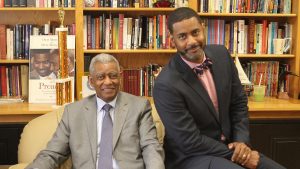 Voter suppression kept my grandfather from voting. It won’t stop me. By Otis Moss III / Wash Post
Voter suppression kept my grandfather from voting. It won’t stop me. By Otis Moss III / Wash Post
 A Star of the ‘Raging Rooks,’ He Helped Change the Face of N.Y.C. Chess. By Joe Lemire / NYT
A Star of the ‘Raging Rooks,’ He Helped Change the Face of N.Y.C. Chess. By Joe Lemire / NYT Trump demolished the walls between politics and sports. He might not like the result. By Jerry Brewer / NYT
Trump demolished the walls between politics and sports. He might not like the result. By Jerry Brewer / NYT The challenges of being a Black play-by-play announcer in the NBA. By Marc J. Spears / The Undefeated
The challenges of being a Black play-by-play announcer in the NBA. By Marc J. Spears / The Undefeated